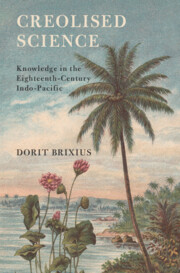Book contents
- Creolised Science
- Science in History
- Creolised Science
- Copyright page
- Dedication
- Contents
- Figures
- Acknowledgements
- Author’s Note
- Abbreviations
- Introduction
- 1 The Limits of French Colonial Visions and Science
- 2 The Acquisition of Knowledge and Plants, from Madagascar to China
- 3 Agriculture and Everyday Knowledge
- 4 Enslaved People as Knowledge Carriers
- 5 The Cross-Cultural Quest for Spices in South East Asia
- 6 Materials, Environment, and the Application of Knowledge
- Conclusion
- Bibliography
- Index
6 - Materials, Environment, and the Application of Knowledge
Published online by Cambridge University Press: 03 April 2024
- Creolised Science
- Science in History
- Creolised Science
- Copyright page
- Dedication
- Contents
- Figures
- Acknowledgements
- Author’s Note
- Abbreviations
- Introduction
- 1 The Limits of French Colonial Visions and Science
- 2 The Acquisition of Knowledge and Plants, from Madagascar to China
- 3 Agriculture and Everyday Knowledge
- 4 Enslaved People as Knowledge Carriers
- 5 The Cross-Cultural Quest for Spices in South East Asia
- 6 Materials, Environment, and the Application of Knowledge
- Conclusion
- Bibliography
- Index
Summary
Chapter 6 provides a detailed explanation of the practical and political challenges faced by the projects to introduce nutmeg (and clove) into Mauritius. It is about the experiential and unsettled knowledge mobilised in the French attempts to acclimatise spices. It engages with the material practices associated with transportation and acclimatisation. The chapter explores various examples of highly ambivalent strategies for the transport on ships and cultivation in foreign soil of the spices. All of these were by no means initiated in the metropolis. This chapter is primarily concerned with natural obstacles, or rather how local actors in Mauritius sought to overcome them by employing non-conventional strategies and initiatives. Using the example of grafting, it argues that techniques and methods were developed independently in different parts of the world, and were not ‘transferred’ from Europe to the colonies, or vice versa. The sketchy and uncertain knowledge of the French remained fragmented until at least the 1780s, which led to miscalculations and an eventual failure of the project to establish a spice trade. Exploring the reasons for this failure, the last chapter reinforces calls to understand the decentred, complex, and slow process of plant knowledge in the making.
Keywords
- Type
- Chapter
- Information
- Creolised ScienceKnowledge in the Eighteenth-Century Indo-Pacific, pp. 183 - 211Publisher: Cambridge University PressPrint publication year: 2024



